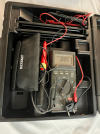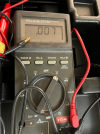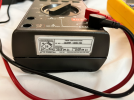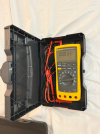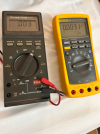HUGE Fluke fan here.
I ran a tech support operation with >100 techs, and I saw to it that all of them had both 87s and Scopemeters (now long since obsolete, but hugely revolutionary in the 90s). I spent a good bit of time at the (then) Fluke headquarters near Chicago and was treated like royalty -their support and training were second to none.
Unfortunately, I did NOT snag any of them upon my (non-voluntary) departure (others, being craftier, Did) but I did buy some off ebay after I retired.
(Keep in mind that my old National Semiconductor (!), Hitachi, and Radio Shack (!!!) meters from the 70s are still working just fine!)
I ended with a 187, but mistakenly thought I was ordering the one with a USB data logger (this one only has internal logger) port. Otherwise, it's a beast - and amazingly fits rather nicely in a mini-festool case.
Best deal though was (may still be) an ex-US air force 27/FM, in original carrying case, as they are regularly calibrated (mine was last calibrated in 2015) - apparently the air force upgrades every few years, so these types of things are fairly common. High volt 'wand' is a nice 'will never need' accessory.
Both are TrueRMS. The 27 is actually a bit larger than the 187!
Read thru various specs (Flukes are - were? - known for accurate specs) to meet your specific freak (freq) requirements.
One thing I found more and more helpful over time was backlit displays, so something you might want to include in your considerations.
Oh, and though there are fine fluke meters made for the domestic chinese market, I've found the few of these I looked at a bit too, uh, unweighty?
Durability has to be a consideration on all these things, esp if you work on ladders or outdoors or construction sites.
And watch out for counterfits.
That spreadsheet is extremely useful for comparing features on 'older' (ie ebay) fluke meters.
